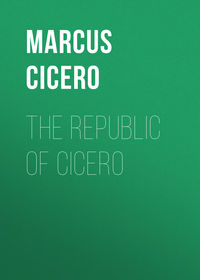 полная версия
полная версияDe Amicitia, Scipio's Dream
2 FANNIUS It is as you say, [Footnote: The reference is to what Laelius is supposed to have said already. The dialogue, as given here, is made to commence in the midst of a conversation.] Laelius, for there never was a better man, or one more justly renowned, than Africanus, But you ought to bear it in mind that the eyes of all are turned upon you at this time, for they both call you and think you wise. This distinction has been latterly given to Cato, and you know that in the days of our fathers Lucius Atilius [Footnote: The first Roman known to have borne the surname of Sapiens He was one of the earliest of the juriconsults who took pupils.] was in like manner surnamed The Wise, but both of them were so called for other reasons than those which have given you this name,—Atilius, for his reputation as an adept in municipal law, Cato, for the versatility of his endowments for there were reported to his honor many measures wisely planned and vigorously carried through in the Senate, and many cases skilfully defended in the courts, so that in his old age The Wise was generally applied to him as a surname. But you are regarded as wise on somewhat different grounds, not only for your disposition and your moral worth, but also for your knowledge and learning, and not in the estimation of the common people, but in that of men of advanced culture, you are deemed wise in a sense in which there is reason to suppose that in Greece—where those who look into these things most discriminatingly do not reckon the seven who bear the name as on the list of wise men—no one was so regarded except the man in Athens whom the oracle of Apollo designated as the wisest of men.[Footnote: Socrates.] In fine, you are thought to be wise in this sense, that you regard all that appertains to your happiness as within your own soul, and consider the calamities to which man is liable as of no consequence in comparison with virtue. I am therefore asked, and so, I believe, is Scaevola, who is now with us, how you bear the death of Africanus; and the question is put to us the more eagerly, because on the fifth day of the mouth next following, [Footnote: Latin, proxumis nonis. The nones, the ninth day before the ides, fell on the fifth of the month, except in March. May, July, and October, when the ides were two days later. We have elsewhere intimation that the Augurs held a meeting for business on the nones of each month.] when we met, as usual, in the garden of Decimus Brutus the Augur, to discuss our official business, you were absent, though it was your habit always on that day to give your most careful attendance to the duties of your office.
SCAEVOLA. As Fannius says, Caius Laelius, many have asked me this question. But I answered in accordance with what I have seen, that you were bearing with due moderation your sorrow for the death of this your most intimate friend, though you, with your kindly nature, could not fail to be moved by it; but that your absence from the monthly meeting of the Augurs was due to illness, not to grief.
LAELIUS. You were in the right, Scaevola, and spoke the truth; for it was not fitting, had I been in good health, for me to be detained by my own sad feeling from this duty, which I have never failed to discharge; nor do I think that a man of firm mind can be so affected by any calamity as to neglect his duty. It is, indeed, friendly in you, Fannius, to tell me that better things are said of me than I feel worthy of or desire to have said; but it seems to me that you underrate Cato. For either there never was a wise man (and so I am inclined to think), or if there has been such a man, Cato deserves the name. To omit other things, how nobly did he bear his son's death! I remembered Paulus, [Footnote: Paulus Aemilius, who lost two sons, one a few days before, the other shortly after, the triumph decreed to him for the conquest of the Macedonian King Perseus.] I had seen Gallus,[Footnote: Gaius Sulpicius Gallus, mentioned as an astronomer by Cicero, De Officiis, i. 6, and De Senectute, 14.] in their bereavements. But they lost boys; Cato, a man in his prime and respected by all.[Footnote: The younger Cato had won fame as a soldier and distinguished eminence as a jurist. At the time of his death he was praetor elect.] Beware how you place in higher esteem than Cato even the man whom Apollo, as you say, pronounced superlatively wise; for it is the deeds of Cato, the sayings of Socrates, that are held in honor. Thus far in reply to Fannius. As regards myself, I will now answer both of you.
3. Were I to deny that I feel the loss of Scipio, while I leave it to those who profess themselves wise in such matters to say whether I ought to feel it, I certainly should be uttering a falsehood. I do indeed feel my bereavement of such a friend as I do not expect ever to have again, and as I am sure I never had beside. But I need no comfort from without, I console myself, and, chief of all, I find comfort in my freedom from the apprehension that oppresses most men when their friends die, for I do not think that any evil has befallen Scipio. If evil has befallen, it is to me. But to be severely afflicted by one's own misfortunes is the token of self-love, not of friendship. As for him, indeed who can deny that the issue has been to his pre-eminent glory? Unless he had wished—what never entered into his mind—an endless life on earth what was there within human desire that did not accrue to the man who in his very earliest youth by his incredible ability and prowess surpassed the highest expectations that all had formed of his boyhood, who never sought the consulship, yet was made consul twice, the first time before the legal age,[Footnote: He left the army in Africa B.C. 147 for home to offer himself as a candidate for the aedileship, for which he had just reached the legal age of thirty seven; but such accounts of his ability efficiency, and courage had preceded him and followed him from the army, that he was chosen Consul, virtually by popular acclamation.] the second time in due season as to himself, but almost too late for his country,[Footnote: The war in Spain had been continued for several years, with frequent disaster and disgrace to the Roman army, when Scipio, B.C. 134, was chosen Consul with a special view to this war, which he closed by the capture and destruction of Numantia, inconnection with which, it must be confessed, his record is rather that of a relentless and sanguinary enemy than of a generous and placable antagonist.] who by the overthrow of two cities implacably hostile to the Roman empire put a period, not only to the wars that were but to wars that else must have been? What shall I say of the singular affability of his manners, of his filial piety to his mother, [Footnote: He was the son of Paulus Aemilius, and the adopted son of Publius Cornelius Scipio Africanus. His mother, divorced for no assignable reason, was left very poor, and her son, on the death of the widow of his adopting father, gave her the entire patrimony that came into his possession.] of his generosity to his sisters, [Footnote: After his mother's death, law and custom authorized him to resume what he had given her, but he bestowed it on his sisters, thus affording them the means of living comfortably and respectably.] of his integrity in his relations with all men? How dear he was to the community was shown by the grief at his funeral. What benefit, then, could he have derived from a few more years? For, although old age be not burdensome,—as I remember that Cato, the year before he died, maintained in a conversation with me and Scipio, [Footnote: The De Senectute]—it yet impairs the fresh vigor which Scipio had not begun to lose. Thus his life was such that nothing either in fortune or in fame could be added to it, while the suddenness of his death must have taken away the pain of dying. Of the mode of his death it is hard to speak with certainty, you are aware what suspicions are abroad. [Footnote: He retired to his sleeping apartment apparently in perfect health, and was found dead on his couch in the morning,—as was rumored, with marks of violence on his neck. His wife was Sempronia, the sister of the Gracchi whose agrarian schemes he had vehemently opposed. She was suspected of having at least given admission to the assassin, and even her mother, the Cornelia who has been regarded as unparelleled among Roman women for the virutes appertaining to a wife and mother, did not escape the charge of complicity. Her son Caius was also among those suspected, but the more probable opinion is that Papirius Carbo was alone answerable for the crime. Carbo had been Scipio's most bitter enemy and had endeavoured to inflame the people against him as their enemy.] But this may be said with truth that of the many days of surpassing fame and happiness which Publius Scipio saw in his lifetime, the most glorious was the day before his death when on the adjournment of the Senate he was escorted home by the Conscript Fathers, the Roman people, the men of Latium and the allies, [Footnote: Scipio had at that session of the senate proposed a measure in the utmost degree offensive to Caius Gracchus and his party. The law of Tiberius Gracchus would have disposed, at the hands of the commissioners appointed under it, of large tracts of land belonging to the Italian allies. Scipio's plan provided that such lands should be taken out of the jurisdiction of the commissioners, and that matters relating to them should be adjudged by a different board to be specially appointed—a measure which would have been a virtual abrogation of the agrarian law. On this account he had his honorable escort home, and on this account, in all probability, he was mudered.]—so that from so high a grade of honor he seems to have passed on into the assembly of the gods rather than to have gone down into the underworld.
4 For I am far from agreeing with those who have of late promulgated the opinion that the soul perishes with the body and that death blots out the whole being. [Footnote: The reference here is of course to the Epicurians. This school of philosophy had grown very rapidly, and numbered many disciples when this essay was written; but in the time of Laelius it had but recently invaded Rome, and Amafanius, who must have been his contemporary, was the earliest Roman writer who expounded its doctrine] I on the other hand attach superior value to the authority of the ancients whether that of our ancestors who established religious rites for the dead which they certainly would not have done if they had thought the dead wholly unconcerned in such observances [Footnote: This is sound reasoning as these rites were annually renewed and consisted in great part of the invocation of ancestors—a custom which could not have originated if those ancestors were supposed to be utterly dead. This passage may remind the reader of the answer of Jesus Christ to the Sadducees, who denied that the Pentateuch contained any intimation of immortality. He quotes the passage in which God is represented as saying, "I am the God of Abraham, and the God of Isaac, and the God of Jacob," and adds, "God is not the God of the dead, but of the living," implying that ancestors whom the writer of that record supposed to be dead could not have been thus mentioned.] or thatof the former Greek colonists in this country who by their schools and teaching made Southern Italy [Footnote: Latin Magna Graecia-the name given to the cluster of Greek colonies that were scattered thick along the shore of Southern Italy. At Croton in Magna Graecia Pythagoras established his school and the colonies were the chief seat and seminary of his philosophy which taught the immortality of the soul.]—now in its decline, then flourishing—a seat of learning, or that of him whom the oracle of Apollo pronounced the wisest of men who said not one thing to-day, another to-morrow, as many do, but the same thing always, maintaining that the souls of men are divine, and that when they go out from the body, the return to heaven is open to them, and direct and easy in proportion to their integrity and excellence. This was also the opinion of Scipio, who seemed prescient of the event so near, when, a very short time before his death, he discoursed for three successive days about the republic in the presence of Philus, Manilius, and several others,—you, Scaevola, having gone with me to the conferences,—and near the close of the discussion he told us what he said that he had heard from Africanus in a vision during sleep. [Footnote: The De Republica consists of dialogues on three successive days in Scipio's garden, and Scipio is the chief speaker. The work was supposed to be irrecoverably lost, with the exception of this Dream of Scipio and a few fragments, but considerable portions of it were discovered in a palimpsest in 1822. The Dream of Scipio will be found in the latter part of this volume.] If it is true that the soul of every man of surpassing excellence takes flight, as it were, from the custody and bondage of the body, to whom can we imagine the way to the gods more easy than to Scipio? I therefore fear to mourn for this his departure, lest in such grief there be more of envy than of friendship. But if truth incline to the opinion that soul and body have the same end, and that there is no remaining consciousness, then, as there is nothing good in death, there certainly is nothing of evil For if consciousness be lost, the case is the same with Scipio as if he had never been born, though that he was born I have so ample reason to rejoice, and this city will be glad so long as it shall stand Thus in either event, with him, as I have said, all has issued well, though with great discomfort for me, who more fittingly, as I entered into life before him ought to have left it before him. But I so enjoy the memory of our friendship, that I seem to have owed the happiness of my life to my having lived with Scipio, with whom I was united in the care of public interests and of private affairs, who was my companion at home and served by my side in the army [Footnote: Laelus went with Scipio on the campaign which resulted in the destruction of Carthage.] and with whom—and therein lies the special virtue of friendship—I was in perfect harmony of purpose, taste, and sentiment. Thus I am now not so much delighted by the reputation for wisdom of which Fannius has just spoken, especially as I do not deserve it, as by the hope that our friendship will live in eternal remembrance, and this I have the more at heart because from all ages scarce three or four pairs of friends are on record, [Footnote: Those referred to probably Theseus and Peirithous, Achilles and Patroclus, Orestes and Pylades, Damon and Phintius,—all but the last, perhaps the last also, mythical] on which list I cannot but hope that the friendship of Scipio and Laelius will be known to posterity.
FANNIUS. It cannot fail, Laelius, to be as you desire. But since you have made mention of friendship, and we are at leisure, you will confer on me a very great favor, and, I trust, on Scaevola too, if, as you are wont to do on other subjects when your opinion is asked, you will discourse to us on friendship, and tell us what you think about it, in what estimation you hold it, and what rules you would give for it.
SCAEVOLA. This will indeed be very gratifying to me, and had not Fannius anticipated me, I was about to make the same request. You thus will bestow a great kindness on both of us.
5. LAELIUS. I certainly would not hesitate, if I had confidence in my own powers; for the subject is one of the highest importance, and, as Fannius says, we are at leisure. It is the custom of philosophers, especially among the Greeks, to have subjects assigned to them, which they discuss even without premeditation. [Footnote: This was the boast and pride of the Greek sophists.] This is a great accomplishment, and requires no small amount of exercise. I therefore think that you ought to seek the treatment of friendship by those who profess this art. I can only advise you to prefer friendship to all things else within human attainment, insomuch as nothing beside is so well fitted to nature,—so well adapted to our needs whether in prosperous or in adverse circumstances. But I consider this as a first principle—that friendship can exist only between good men. In thus saying, I would not be so rigid in definition [Footnote: Latin. Neque ut ad ilium reseco, literally, nor in this matter do I cut to the quick.] as those who establish specially subtle distinctions, [Footnote: The Stoics of the more rigid type, who maintained that the wise man alone is good, but denied that the truly wise man had yet made his appearance on the earth.] with literal truth it may be, but with little benefit to the common mind; for they will not admit that any man who is not wise is a good man. This may indeed be true. But they understand by wisdom a state which no mortal has yet attained; while we ought to look at those qualities which are to be found in actual exercise and in common life, not at those which exist only in fancy or in aspiration. Caius Fabricius, Manius Curius, Tiberius Coruncanius, wise as they were in the judgment of our fathers, I will consent not to call wise by the standard of these philosophers. Let them keep for themselves the name of wisdom, which is invidious and of doubtful meaning, if they will only admit that these may have been good men. But they will not grant even this; they insist on denying the name of good to any but the wise. I therefore adopt the standard of common sense. [Footnote: Latin agamus igitur piagui (ut aiunt) Minerva, that is with a less refined, a grosser wisdom more nearly conformed to the sound, if somewhat crass, common-sense of the majority.] Those who integrity, equity, and kindness win approval, who are entirely free from avarice, lust and the infirmities of a hasty temper, and in whom there is perfect consistency of character, in fine men like those whom I have named while they are regarded as good, ought to be so called, because to the utmost of human capacity they follow Nature who is the best guide in living well. Indeed, it seems to me thoroughly evident that there should be a certain measure of fellowship among all, but more intimate the nearer we approach one another. Thus this feeling has more power between fellow-citizens than toward foreigners, between kindred than between those of different families. Toward our kindred, Nature herself produces a certain kind of friendship. But this lacks strength, and indeed friendship in its full sense, has precedence of kinship in this particular, that good-will may be taken away from kinship, not from friendship, for when good will is removed, friendship loses its name, while that of kinship remains. How great is the force of friendship we may best understand from this,—that out of the boundless society of the human race which Nature has constituted, the sense of fellowship is so contracted and narrowed that the whole power of loving is bestowed on the union of two or a very few friends.
6 Friendship is nothing else than entire fellow feeling as to all things human and divine with mutual good-will and affection; [1] and I doubt whether anything better than this, wisdom alone excepted, has been given to, man by the immortal gods Some prefer riches to it, some, sound health, some, power, some, posts of honor, many, even sensual gratification. This last properly belongs to beasts, the others are precarious and uncertain, dependent not on our own choice so much as on the caprice of Fortune. Those, indeed, who regard virtue as the supreme good are entirely in the right, but it is virtue itself that produces and sustains friendship, not without virtue can friendship by any possibility exist. In saying this, however I would interpret virtue in accordance with our habits of speech and of life, not defining it, as some philosophers do, by high-sounding words, but numbering on the list of good men those who are commonly so regarded,—the Pauli, the Catos, the Galli, the Scipios, the Phili Mankind in general [1 It may be doubted whether this close conformity of opinion and feeling is essential, or even favorable to friendship. The amicable comparison and collision of thought and sentiment are certainly consistent with, and often conducive to the most friendly intimacy Friends are not infrequently the complements, rather than the likeness, of each other Cicero and Atticus were as close friends as Scipio and Laelius; but they were at many points exceedingly unlike. Atticus had the tact and skill in worldly matters, which Cicero lacked. Atticus kept aloof from public affairs while Cicero was unhappy whenever he could not imagine himself as taking a leading part in them. Atticus was an Epicurran, and Cicero never lost an opportunity of attacking the Epicurean philosophy.] are content with these. Let us then leave out of the account such good men as are nowhere to be found. Among such good men as there really are, friendship has more advantages than I can easily name. In the first, place, as Ennius says;—
"How can life be worth living, if devoid Of the calm trust reposed by friend in friend? What sweeter joy than in the kindred soul, Whose converse differs not from self-communion?"
How could you have full enjoyment of prosperity, unless with one whose pleasure in it was equal to your own? Nor would it be easy to bear adversity, unless with the sympathy of one on whom it rested more heavily than on your own soul. Then, too, other objects of desire are, in general, adapted, each to some specific purpose,—wealth, that you may use it; power, that you may receive the homage of those around you; posts of honor, that you may obtain reputation; sensual gratification, that you may live in pleasure; health, that you may be free from pain, and may have full exercise of your bodily powers and faculties. But friendship combines the largest number of utilities. Wherever you turn, it is at hand. No place shuts it out. It is never unseasonable, never annoying. Thus, as the proverb says, "You cannot put water or fire to more uses than friendship serves." I am not now speaking of the common and moderate type of friendship, which yet yields both pleasure and profit, but, of true and perfect friendship, like that which existed in the few instances that are held in special remembrance. Such friendship at once enhances the lustre of prosperity, and by dividing and sharing adversity lessens its burden.
7. Moreover, while friendship comprises the greatest number and variety of beneficent offices, it certainly has this special prerogative, that it lights up a good hope for the time to come, and thus preserves the minds that it sustains from imbecility or prostration in misfortune. For he, indeed, who looks into the face of a friend beholds, as it were, a copy of himself. Thus the absent are present, and the poor are rich, and the weak are strong, and—what seems stranger still [Footnote: Literally, what is harder to say.]—the dead are alive, such is the honor, the enduring remembrance, the longing love, with which the dying are followed by the living; so that the death of the dying seems happy, the life of the living full of praise. [Footnote: The sense of this sentence is somewhat overlaid by the rhetoric; yet it undoubtedly means that an absent friend is esteemed and honored in the person of the friend who not only loves him, but is regarded as representing him; that a poor friend enjoys the prosperity of his rich friend as if it were his own; that a weak friend feels his feebleness energized by the friend who in need will fight his battles for him; and that no man is suffered to lapse from the kind and reverent remembrances of those who see his likeness in the friend who keeps his memory green.] But if from the condition of human life you were to exclude all kindly union, no house, no city, could stand, nor, indeed, could the tillage of the field survive. If it is not perfectly understood what virtue there is in friendship and concord, it may be learned from dissension and discord. For what house is so stable, what state so firm, that it cannot be utterly overturned by hatred and strife? Hence it may be ascertained how much good there is in friendship. It is said that a certain philosopher of Agrigentum [Footnote: Empedocles. Only a few fragments of his great poem are extant. His theory seems like a poetical version of Newton's law of universal gravitation. The analogy between physical attraction and the mutual attraction of congenial minds and souls has its record in the French word aimant, denoting loadstone or magnet.] sang in Greek verse that it is friendship that draws together and discord that parts all things which subsist in harmony, and which have their various movements in nature and in the whole universe. The worth and power of friendship, too, all mortals understand, and attest by their approval in actual instances. Thus, if there comes into conspicuous notice an occasion on which a friend incurs or shares the perils of his friend, who can fail to extol the deed with the highest praise? What shouts filled the whole theatre at the performance of the new play of my guest [Footnote: Or host; for the word hospes may have either meaning. It denotes not the fact of giving or receiving hospitality, but the permanent and sacred relation established between host and guest. This relation has lost much of its character in modern civilization, and I doubt whether it has a name in any modern European language.] and friend Marcus Pacuvius, when—the king not knowing which of the two was Orestes—Pylades said that he was Orestes, while Orestes persisted in asserting that he was, as in fact he was, Orestes! [Footnote: Among the many and conflicting legends about Orestes is that which seems to have been the theme of the lost tragedy of Pacuvius. Orestes, after avenging on his mother and her paramour the murder of his father, in order to expiate the guilt of matricide, was directed by the Delphian oracle to go to Tauris, and to steal and transport to Athens an image of Artemis that had fallen from heaven. His friend Pylades accompanied him on this expedition. They were seized by Thoas the king, and Orestes, as the principal offender, was to be sacrificed to Artemis. His sister, Iphigeneia, priestess of Artemis, contrived their escape, and the three arrived safe at Athens with the sacred image.] The whole assembly rose in applause at this mere fictitious representation. What may we suppose that they would have done, had the same thing occurred in real life? In that case Nature herself displayed her power, when men recognized that as rightly done by another, which they would not have had the courage to do themselves. Thus far, to the utmost of my ability as it seems to me, I have given you my sentiments concerning friendship. If there is more to be said, as I think that there is, endeavor to obtain it, if you see fit, of those who are wont to discuss such subjects.









